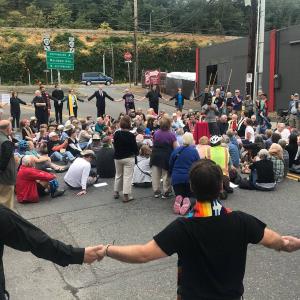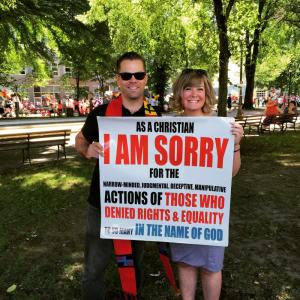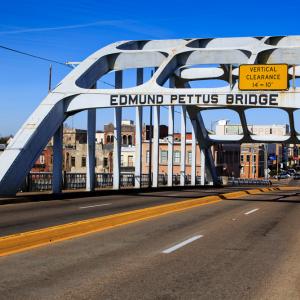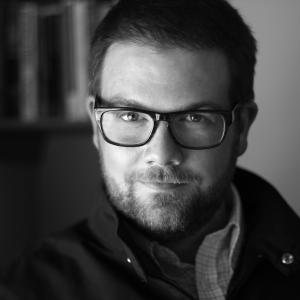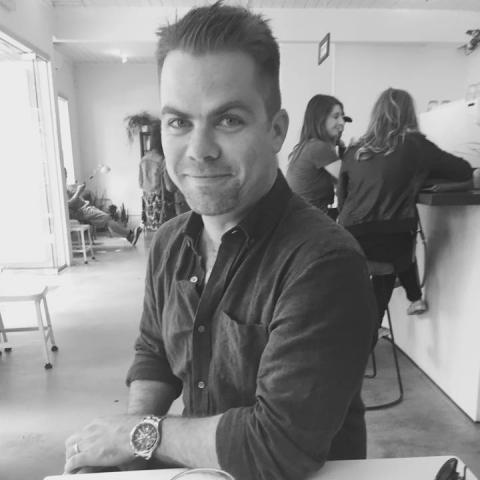
Adam Phillips is pastor of Christ Church: Portland, an open, active, and inclusive Christ-centered community in Portland, Ore. He has served in community development and advocacy initiatives with the ONE Campaign, World Vision, Micah Challenge, Bread for the World, One Days Wages, and Oasis. A graduate of North Park Seminary and The Ohio State University, Adam grew up in the Evangelical Covenant Church. Only a year into their new church plant, the Covenant church severed ties with Christ Church, cutting two-years of promised funding over LGBTQ inclusion matters. In 2010, Adam was a delegate to the Third Lausanne Congress on World Evangelization in Cape Town, South Africa. He is married to Sarah Phillips, an educator.
Posts By This Author
Oregon Clergy To ICE: 'Let Our People Go!'
Knowing that so many more suffer from inhumane incarceration, I joined with more than 20 interfaith clergy from around Oregon and got arrested “for failure to comply” by sitting in a prayer circle in front of the main gates of our local ICE field office. We were gathered with hundreds of others, lifting up stories of those still detained and separated from families, singing songs of lament and joy, and praying that justice would prevail.
Courageous Leadership Is Actually Vulnerable, Humble Belonging
On Bill Hybels and #ChurchToo

By Ianphilpot at English Wikipedia, CC BY-SA 3.0
The evangelical world in which I came of age was created in Bill Hybels' image. Nearly singular in his influence and power, Hybels was one of a handful of Baby Boomer church innovators who reimagined church to be “seeker sensitive,” designed for the spiritually curious who also might be searching for the convenience of a food court, parking lot, and sermons on tape that were ready for purchase in the lobby by the time the worship band sang the final chorus of the recessional.
DeVos Is a Committed Christian. She'd Be a Terrible Education Secretary.
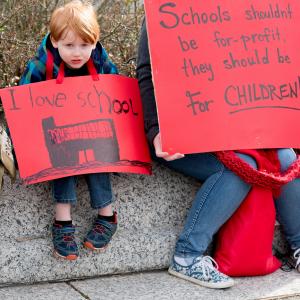
Image via Victoria Pickering/Flickr
People of faith should be about forming a circle of protection when it comes to kids’ safety, flourishing, and equal access to great education. In these times, we also need robust debate about what policies best reflect our values. We, and our kids, will all be better for it.
What Will a Trump-Pence Administration Mean for LGBTQ Rights?
It’s the middle of Advent. As a pastor, that’s like saying it’s college basketball’s March Madness (go Buckeyes, by the way). Our church in Portland, Ore., is busy prepping our Christmas Eve worship service and organizing our Christmas Day homeless service project — so why am I in Washington, D.C., to talk about LGBTQ?
Because my faith compels me.
Weekly Wrap 8.19.16: The 10 Best Stories You Missed This Week
Editor's Note: This week's Wrap was guest curated by Sojourners contributor Adam Phillips. By way of introduction, Phillips is pastor of Christ Church: Portland (Ore.), a new open, active, and inclusive community. He enjoys a Stiegl Radler after his bicycle commute, has still not seen Stranger Things, and thinks that Mellon Collie & The Infinite Sadness is seven songs too long. Read along for his top stories and notes from the week!
It’s the dog days of summer (100 degrees in Portland, Ore. for crying out loud!). So here’s a random assortment of stories you might have missed that you could slip into your Sunday sermon or small group class to see if anyone is paying attention.
Oregon: 157 Years and Still Overcoming Exclusion
White Supremacy and Temptations In the Deserts of Our History
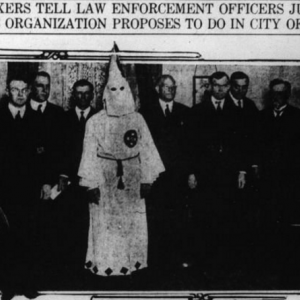
Image via Twitter
Did you know that Oregon was founded as place for white people only?
Yes. Yes, it was.
In a complicated twisting political tale of pre-Civil War American history, enshrined in my state’s constitution were explicit and clear black exclusion laws.
No, Falwell, We Don't Need Christian Students Forming Anti-Muslim Gun Patrols

Image via Africa Studio/Shutterstock.com
According to the Washington Post:
“If some of those people in that community center had what I have in my back pocket right now …,” he said while being interrupted by louder cheers and clapping. “Is it illegal to pull it out? I don’t know,” he said, chuckling.
“I’ve always thought that if more good people had concealed-carry permits, then we could end those Muslims before they walked in,” he says, the rest of his sentence drowned out by loud applause while he said, “and killed them.”
“I just wanted to take this opportunity to encourage all of you to get your permit. We offer a free course,” he said. “Let’s teach them a lesson if they ever show up here.”
A Christian leader, at one of the most influential evangelical colleges, told a basketball arena full of 18–22 year olds to get guns and carry them around in their back pockets in order to take on any radical Muslims that might make their way down to Lynchburg, Va.
Advent: It's the End of the World As We Know It
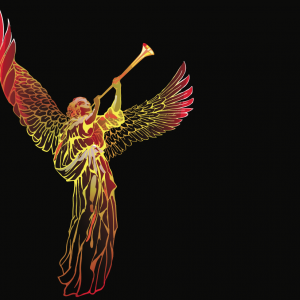
Image via Babin/Shutterstock.com
If this is your first Advent, or if it has been awhile, let me catch you up. Advent is the season of expectant waiting before Christmas. It’s a time to wake up, slow down, sit still, listen, and wait. A kind of expected, engaged waiting, with one another. And the first Sunday of Advent — celebrated on the four Sundays before Christmas — always starts with apocalyptic end-of-world scenarios.
Again, an odd way to start. But I think there is wisdom in it. The ancients saw fit to remind us of the harried, violent world into which the Christ child was born. Which, if we are honest, is also like the world in which we find ourselves.
Violence, brokenness, and heartache can take many forms. Each of us experience the heartache of recent weeks. Maybe it was a year-long affair; or Paris; or a lost job; or mass gun violence; or depression; or Laquan McDonald in Chicago, Ill.; or Garret Swasey in Colorado Springs, Colo.
‘As a Christian, I am Sorry’: Evangelical Pastor’s Reflections on Attending First Pride Parade
I walked down Burnside and the first parade on-lookers squinted and began to read my placard. I did not know what to expect at first: Did they think I was protesting Pride? Would they accept my apology?
I was overwhelmed by the response. People began to cheer. Many asked me to slow down so they could take a picture. Some wiped away tears and simply mouthed “thank you,” or “I accept [your apology].” For the next few miles cheers and cameras and tears greeted us everywhere we went. I was grateful I was wearing sunglasses, because there were a few moments where I simply welled up with tears and couldn’t handle it any more.
Turning the Tables: A Lenten Sermon on Jesus, the Money Changers, and #Selma50
Making a whip of cords, he drove all of them out of the temple, both the sheep and the cattle. He also poured out the coins of the money-changers and overturned their tables.He told those who were selling the doves, ‘Take these things out of here! Stop making my Father’s house a market-place!’ - John 2:15,16
This is one of the most important stories in the life of Jesus. So important, that it’s one of a handful of stories that all four Gospel writers actually all share.
Even though they remember it differently.
Matthew, Mark, and Luke — they recall that this episode where Jesus entered the Temple grounds and stirred stuff up once and for all — they remember it near the end of his life. They place it as one of the main reasons that Jesus is arrested and put to death as a capitol offense against the Roman Empire.
Walking into the Temple — run by the Jewish religious elite who had been put in place by the Roman imperial oppressors — was tantamount into walking into a federal government building and blowing it up.
Except Jesus doesn’t do that. Jesus is a pacifist. Jesus is a prophet.
When Love with Limits Isn’t Love at All: Thoughts on Exclusion in a Time for Inclusion
I’ve always cringed when I hear someone say, “Love the sinner but hate the sin.”
In the end, I don’t quite know how to do that. I get the sentiment, and I think it basically comes from a well-intentioned place. Essentially, when someone says this, I think they’re trying to be kind and caring for the person above and beyond any kind of vice or sinful deeds that person has committed. You know: Man, I really love Steve but I hate his alcohol addiction. Deborah is a wonderful friend but her tendency to gossip is really not so wonderful. James has a heart of gold but I just can’t condone his adultery.
We love and affirm people but we don’t affirm the things they do that hurt themselves, others, or are an affront to God’s dream for them and their God-given potential.
But sin is not just the things we do (or do not do — there are both sins of commission and omission). Sin is something we can’t quite shake. While we’re first created good, as Desmond Tutu has reminded us, we certainly fall short (always be sure to remember Genesis 1:31 as the first word and Genesis 3 as the second).
Sin is a reality of our brokenness this side of Jesus’s return and that fully realized realm of God where there will be shalom and no one will hunger or cry anymore. Sin isn’t the way it’s supposed to be. So many want to make it out to be a laundry list of "don’ts" along life’s way — our faith, in the end, teaches us that it’s so much more than that.
I reject the whole notion of love the sinner but hate the sin — it misses the Gospel point that we are more than our inadequacies or things that we’ve done or not done that have missed the mark. We are better than our sin — we are created in the beautiful image of God.
Dreaming of God With Us
Author's Note: As we close out Advent, when we so quickly determine what’s our legal right or what we’re owed or what “the Bible really says” when, after all, we’re just simply too quick to judge. In these days where we must affirm #BlackLivesMatter, where we must stand up for victims of rape and abuse, and where we must struggle with our LGBTQ sisters and brothers for full inclusion, sermons like this are humbly offered.
We know the Christmas story well.
Those of us that have grown up with regular, annual, church-going rhythms — we essentially hear this story once a year.
Even so, those with no regular church commitments — people from all walks of life, people of faith or no particular faith, people from varied faiths — if you asked your friend, your neighbor, your cousin, a stranger on the street, I bet at least 50 percent of the time they’d be able to share the gist of the story:
Jesus was born to a virgin named Mary.
Mary was married to a guy (named Joseph).
There were angels, and wise men, and shepherds.
And I think there was a manger.
We know this story well.
But we hear it so often it becomes rote — literally a mechanically, automatically, mindlessly routine on repetition in our brains.
Yeah, yeah, yeah — 6lb 8oz baby Jesus, in a manger, Virgin Mary, Adopted Dad Joseph, sheep, shepherds, angels, stars at night, wise men, white Christmas, Rudolph the Red Nosed Reindeer …
You get my point.
So, let’s hear the story one more time and lean in a bit to this wild world of dreams, angels, and ancient Jewish marriage contracts.
#BlackLivesMatter: Why We Need to Stop Replying ALL LIVES MATTER
There’s this microaggression happening online, offline, and all around that has a nice sentiment, but really needs to stop. Can we call for a week-long moratorium on decrying “ALL LIVES MATTER?”
This is a request specifically for my white brothers and sisters, especially those in the church.
I, of course, as a white heterosexual married middle-class highly educated American male, believe that all lives matter. It’s something I’ve been fighting for my entire adult life. Whether it is the mother infected with HIV by her wayward husband in western Africa, whether it is the undocumented immigrant father who may be separated from his American-born children, whether it is the NRA card-carrying white uncle who does an honest job and is a good neighbor back in the midwest, whether it is the homeless thirty-something woman coming off a bad meth addiction but needing shelter during a difficult winter, of course, by all means, every life matters.
Your life matters. My life matters. All lives matter.
This is a non-negotiable. This is true. This is what it means to be made in the image of God, as we’re told in the Book of Genesis — everyone, whether you’re white, black, brown, male, female, straight, gay, bisexual, transgender, Republican, Democrat, rich, poor, nice, kind of a jerk, young, old, middle-aged, we all matter.
But these past couple weeks — these past four months, five months, 22 months? — it’s important that we stand with the ever-growing chorus and declare, yes, black lives matter. With the heartbreaking, soul-wrenching death of Michael Brown, the news just yesterday of another non-indictment in the death Eric Garner, or the dark night when Trayvon Martin was shot down in Florida, a chorus of voices has risen to declare with one voice and hashtag that #BLACKLIVESMATTER.
The Dream of the 90s Is Not Quite Alive in Portland
While much of the country was receiving election returns and news of a red tide sweeping across the nation, here in Oregon we have more of a white, black, and brown problem.
One way to look at Oregon was that the “progressive” blues all won — our Democratic incumbents were all re-elected for U.S. Congress and governor, and statewide measures to legalize the sale and use of recreational marijuana sailed to an easy victory.
So, from a distance it looks like the dream of the Bill Clinton 90s is still alive in Portland.
I’ve been here more than a year now, planting a church and beginning to work with neighborhood partners, and have come to realize that the dream for truly “progressive” values — like immigration reform and bridging the gap in ever increasing income inequalities — is more like a bad dream that won’t go away.
To the Dying Church: Get Offline and Get Outside
To a Dying Church,
Guess what? It’s not that bad.
You just have to get it together a bit.
Seriously, like yesterday. I mean, we have time. But, seriously, we’re all waiting for you to get it together.
You have the means. You have the ability. You have the know-how.
Actually, you don’t have to do that much. You just have to realize that Jesus has done it all and there is a current of immense possibility right under your feet.
Tap into it. Remember it. Root down.
This happens every so often. We are cyclical people. Every once in a while we forget.
But this time you’ve really done a doozy on your own health by chasing after insane supplements and growth hormones. And you’ve also picked some really lame fights. In the race to grow you’ve forgotten your way a bit and now you’re bloated and punch-drunk in the streets swinging at anyone that’ll ask a sensible question.
Stop it. You’re better than this.
Faith, Hunger, Politics, Chicken & Waffles: A Conversation Between Chris LaTondresse and Adam Phillips
Adam Nicholas Phillips: Chris, tell us a little bit about yourself.
Christopher LaTondresse: As the son of American evangelical missionary parents, I spent several formative years living in the former Soviet Union — Novosibirsk, Russia to be exact — smack dab in the middle of Siberia. My family is originally from Minnesota, so I was convinced that they were trying to find the one place on the planet colder than our home state to do missions work.
Growing up as a missionary kid, my parents taught me to take my faith seriously, to take Jesus seriously, no matter what the cost. Their example — leaving the trappings of an American middle-class lifestyle behind to pursue something they believed in — sticks with me to this day. The major lesson: There are things in this life worth making exceptional sacrifices for, especially things close to the heart of God.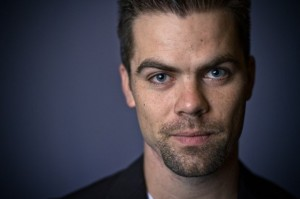
I guess this is really what informs who I am, and animates my work today. True, I’m not a full-time missionary, but I’ve tried to devote my life to playing a role, however small, in what God is doing in the world. For my parents this was about planting churches and, to use the language of the Navigators (the missions organization that sent them) “making disciples”. For me it’s about taking Jesus seriously when he said, “What you do unto the least of least, you do for me.”
Progress, Proof, Promise: Advent Expectations for the End of AIDS

By Reuvenk via Wikimedia Commons (www.gnu.org/copyleft/fdl.html)
The news is hopeful. We have seen both progress and proof:
- New data shows that an HIV-positive person on treatment is 96 percent less likely to pass HIV on to others.
- It only costs, on average, $335 for AIDS treatment through PEPFAR (down nearly 70 percent since 2004!).
- 22 countries in sub-Saharan Africa have reduced new HIV infections by 25 percent.
- Clinical trials show that voluntary male circumcision reduces the risk of new HIV infection in men by roughly 60 percent.
Yesterday was truly a momentous occasion. Looking at all the progress we have made, especially in the last 10 years, it is a moment for us to not only celebrate, but in the words of President Jakaya Kikwete of Tanzania, “recommit ourselves,” to end the fight against AIDS totally.
Adam Phillips answers, "What is an Evangelical?"
Adam Phillips is a Evangelical Covenant Church minister and director of faith mobilization for the ONE Campaign, www.one.org.
This video is the latest installment in an ongoing series at God's Politics where we've asked leading clergy, writers, scholars, artists, activists and others who self-identify as "evangelical" to answer the question, "What is an Evangelical?"
